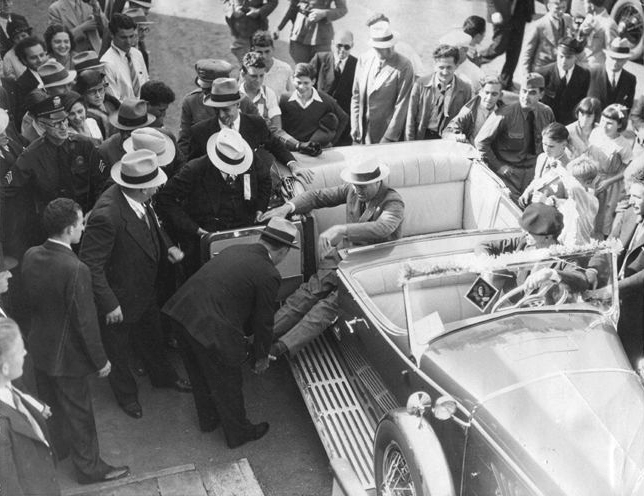The Bully’s Pulpit
Audio of FDR’s first Fireside Chat on March 12, 1933. The respectful, civil discourse of a leader speaking as an adult to adults. Listening to this does take a little over thirteen minutes, however, while reading a tweet takes less than a minute.
Last Sunday, March 12, marked the 84th anniversary of Franklin Delano Roosevelt’s first Fireside Chat, as the series of thirty evening radio programs he did over the twelve years of his presidency came to be known. It was one week after his first inauguration (inaugurations up through 1933 took place on March 4), and he spoke on the banking crisis. He spoke in calm, even tones, with the intent of calming down a populace which had lost confidence in the banking system and withdrawn their funds in a panic. FDR’s fifth cousin, Theodore Roosevelt, had famously touted the use of the Bully Pulpit when he was president at the beginning of the twentieth century, and now that radio had come into widespread use, FDR found himself with a Bully Pulpit that enabled him to speak directly to millions of his fellow Americans at a time, without the filter of the national press. FDR, to his credit, used the privilege of his Bully Pulpit to explain his policies in plain, respectful language, and to garner direct support for those policies from the populace.

FDR exiting car with assistance during a campaign trip to Hollywood, California, on September 24, 1932. Photographs like this are rare because press and official photographers avoided showing FDR’s debility out of consideration for the man.
Reminding us of all we have lost and may still lose. A poignant scene from Out of Africa, a 1985 film starring Meryl Streep and Robert Redford, who by all accounts are good people as well as fine actors.
Now we have found ourselves in an age where a new technology enables the president to use the Bully Pulpit in a new way, but sadly we don’t have a TR or an FDR available to make the best use of it. This is our own fault. This is the culmination of a sequence of bad cultural and political choices by all of us over the past forty years or more. Now a reality television bully of no intellectual or humanitarian distinction whatsoever occupies the Oval Office and has the Bully Pulpit, both technologically from his tweets and personally from his rallies, and his ugly pronouncements echo through a press that eagerly pursues the latest noisy distraction as if chasing a fire engine, all while his deputies commit atrocities on the economy, on the environment, on the very working and middle class people who voted him in, on everything and everybody that isn’t part of the Club. If you have to ask, “What Club?” then obviously you don’t belong. Look at Rex Tillerson, aka Wayne Tracker, formerly head of Exxon Mobil and now Secretary of State, and you will be looking at a member in good standing with the Club.
There’s little point and less fun in belaboring the obvious that the current president abuses the Bully Pulpit to air personal grievances and distract the press and the populace from his administration’s shortcomings, and to gloss over policies that take away from the many, who have little enough, in order to give to the few, who already have more than enough. Here’s a recommendation on how to deal with that: as much as possible considering the position of preeminence granted by the office he holds, ignore his Bully Pulpit abuses. Take a lesson from the actress Meryl Streep and don’t refer to him by name. Deny him the satisfactions of power that he seeks. Yes, it is that childish; yes, it is that schoolyard. He has given evidence of that himself. In all other matters political, do as your conscience dictates, of course, but in this matter of the Bully Pulpit recall past experience with schoolyard bullies by denying him the attention and deference he craves.
― Vita
― Vita

A fuller rendition of the same theme, by the Chamber Orchestra of New York, Salvatore Di Vittorio, Music Director, based on the great John Barry‘s original arrangement.
